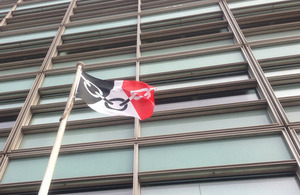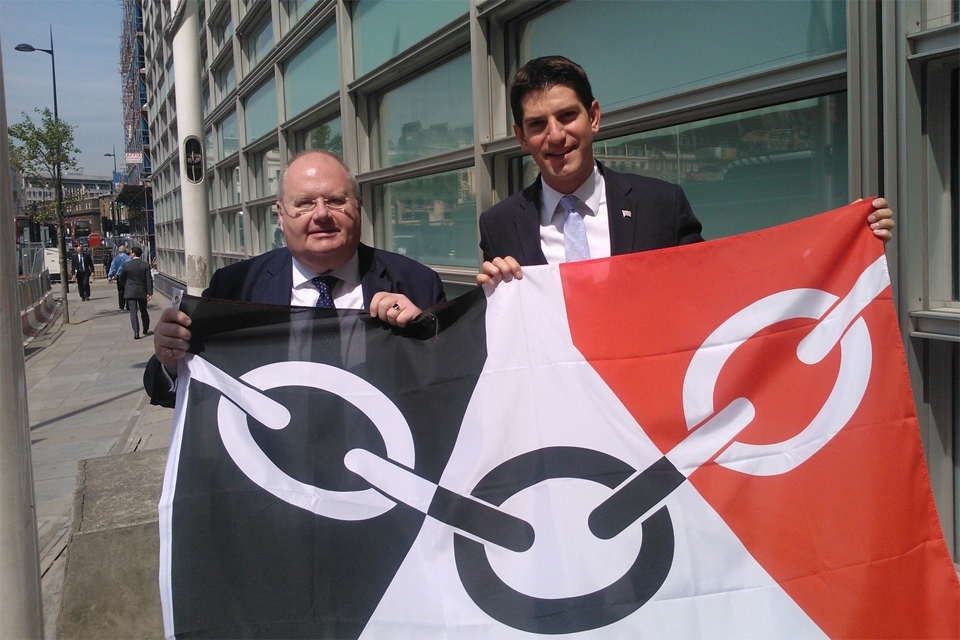Black Country flag flies high in Whitehall
The flag representing the Black Country has been hoisted above the department's offices to coincide with Black Country Day on 14 July.

Black Country flag
A long-recognised industrial heartland based upon the coal seams of Staffordshire and Worcestershire, the Black Country had its flag created and registered last year following a competition organised in conjunction with the iconic Black Country Living Museum.
The ‘Black Country Day’ agreed by the museum and the Black Country Society is 14 July, which is the anniversary of the invention of the world’s first steam engine which was erected in the area. Flying the flag at Eland House, the head quarters of the Department for Communities and Local Government, not only celebrates the Black Country but also Britain’s role in leading the industrial revolution.
In April, the government formally acknowledged the continuing role of England’s traditional counties in English public life. Previously, many parts of Whitehall and municipal officialdom have shunned these counties, many of which date back over a thousand years of English history. This move complements this government’s abolition of unelected regional government in England, based on European Union’s ‘NUTS1’ (Nomenclature of Units for Territorial Statistics) administrative boundaries. By contrast, the celebration of the Black Country reflects how the government is championing the long-standing, traditional localities of England.
The government has amended the law to make it easier to fly flags without a permit from the council - these new freedoms include flying the Black Country flag.

Secretary of State Eric Pickles and Chris Kelly MP hold the flag before it is raised on the flagpole
Eric Pickles said:
We are stronger as a society when we celebrate the ties that bind us together. I want to send a strong signal - we should fly our flags with pride. Whatever one’s class, colour or creed, let’s have pride in Britain’s local and national identities.
Today it is right to celebrate the Black Country, one of England’s industrial giants. The ‘Black Country is defined by geology; it respects no human or administrative boundaries and its origins run deep. When Britain was the workshop of the world, the Black Country was the workshop of Britain. The history and identity of the Black Country is one to be proud of and cherished, and undoubtedly worthy of preservation for future generations.
Andrew Lovett, Director and Chief Executive at the Black Country Living Museum said:
We are delighted at this opportunity for the flag to wave the banner for the region’s unique identity, and its rich and diverse heritage.
Further information
The Black Country flag is being flown alongside the United Kingdom’s Union flag, outside the Department for Communities and Local Government in Victoria, London. It was loaned free of charge by the Flag Institute.
The world’s first steam engine was the Newcomen Engine, a working replica of which exists at the Black Country Living Museum not far from where the original was erected. 14 July is the anniversary of the Newcomen engine, and last year’s official unveiling of the flag.
The designer of the flag was eleven year old Gracie Sheppard of Redhill School in Stourbridge. Her inspiration came from Elihu Burrit, the American Consul to Birmingham when he described the region as “black by day and red by night”.
The flag features a chain to represent the manufacturing heritage of the area whilst the upright triangular shape in the background recalls the iconic glass cones and iron furnaces that featured in the architectural landscape of the area. The red and black colours recall the famous description of the Black Country by Elihu Burrit that it was “black by day and red by night” owing to the smoke and fires of industry.
In DCLG’s liberalised flag flying laws the Black Country flag was one of the few to be mentioned by name.
The government has amended the law to make it easier to fly local and traditional flags without a permit from the council. See Flying flags: a plain English guide.
Further information about the Black Country can be found by visiting the Black Country Society or the Black Country Living Museum.
Media enquiries
Email newsdesk@communities.gov.uk
Please use this number if you are a journalist wishing to speak to Press Office 0303 444 1209